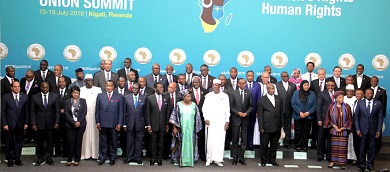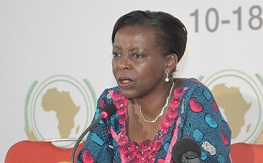Africa gateway
Pan-African passport launched at AU Summit
Elections
Elections were held on Sunday, 17 July for a new chairperson of the AU Commission to replace South Africa's Nkosazana Dlamini-Zuma, along with a roster of new AU commissioners. The new commissioner was to be announced as the summit closed on Monday. The three candidates for the post AU Commissioner, two of them women, were: former Uganda vice-president Specioza Wandira Kazibwe, Botswana foreign minister Pelonomi Venson Moitoi, and Equatorial Guinea foreign minister Agapito Mba Mokuy, according to the international multimedia broadcasting service, Voice of America. Leaders from across Africa
gather in Kigali for the 27th AU Summit, from 10-18 July 2016. (Image: 27th AU Summit)
Briefing the media on 15 July, AU chief of staff Jennifer Chiriga, said that
African heads of state would meet for the first time at a closed session the
following day. "They will be discussing strategic issues, particularly the financing of
the union. We have a report that will be represented.
"We also had a special envoy who has been going around the continent, getting
views of the heads of state on how we can improve our peace fund," she said.
The out-going Commission has three months from the election date to compile
a handover report before exiting. Chiriga said the highlight of the summit would be
the elections. "We are anticipating the summit will be electing a chairperson and a
deputy chairperson. The executive council will
elect eight commissioners. They will
form a new Commission."
Leaders from across Africa
gather in Kigali for the 27th AU Summit, from 10-18 July 2016. (Image: 27th AU Summit)
Briefing the media on 15 July, AU chief of staff Jennifer Chiriga, said that
African heads of state would meet for the first time at a closed session the
following day. "They will be discussing strategic issues, particularly the financing of
the union. We have a report that will be represented.
"We also had a special envoy who has been going around the continent, getting
views of the heads of state on how we can improve our peace fund," she said.
The out-going Commission has three months from the election date to compile
a handover report before exiting. Chiriga said the highlight of the summit would be
the elections. "We are anticipating the summit will be electing a chairperson and a
deputy chairperson. The executive council will
elect eight commissioners. They will
form a new Commission."
Pan-African passport
The Pan-African passport, which will be made available to diplomats and heads of state first, will allow free movement across national borders. Louise Mushikiwabo, foreign affairs minister of Rwanda, explained that although security was a major concern, this would not stop them. "Our strategic thinking is that the fear of insecurity should not stop Africans from moving freely from one country to another." Passports would be delivered symbolically to some heads of state, foreign ministers and a few officials of the AU, she said. Thereafter each AU member state would discuss country-specific design of the passports. "How soon the passports will be implemented will depend on each country and their preparation to distribute widely," she said. The first two recipients were the leaders of Chad and Rwanda. Chadian President Idriss Déby, the body's current chairperson, and Rwandan President Paul Kagame were presented with the passports by Dlamini-Zuma. The passport was launched on Sunday, 17 July at the opening ceremony of the 27th Ordinary Session of the Assembly of the African Union:Video of first @_AfricanUnion passports being issued at #27thAUSummit #KigaliConvention pic.twitter.com/rgiVrWrcYs via @abi_negn
— Calestous Juma (@calestous) July 17, 2016
South Sudan
The most critical issue that was discussed was the resurgence of violence in South Sudan, Mushikiwabo said on 14 July. "We are expecting the secretary-general of the United Nations to meet some leaders on the continent on this matter. This is a very important topic on everybody's mind." Their first concern was the protection of civilians in South Sudan, and then the political process could be put back on track, she added.Agenda 2063
In her statement on Sunday, Dlamini-Zuma said they were hopeful regarding the implementation of Agenda 2063. "Work started on the Agenda 2063 flagship projects and the first Ten-Year Implementation Plan, and over two-thirds of countries and (regional economic communities) began domesticating this collective vision of the Africa we want. "On the sidelines of this summit, the commission met African editors, discussing the role they should play in popularising Agenda 2063, in holding up a mirror that reflects African stories in their great diversity, in changing mindsets, shaping an African narrative that is pan-African and promoting our Renaissance. To do this, they told me to transmit humbly to the excellencies, they require freedom of the press and not to be persecuted for telling the truth," she said. Dlamini-Zuma also spoke about the third High Level Panel on Gender Equality. "Over 400 mainly women and some men from across the continent and the diaspora repeated their call to strengthen financing for gender and the role of women in peace processes."The AU and the OAU
The OAU was founded by 32 African countries at a meeting in Addis Ababa, in Ethiopia in 1963. By 2002, membership had grown to 53, when the organisation of African states was renamed the African Union. In 2011 it grew by one, when South Sudan became a member following that country's creation. According to the AU website, the OAU's main objectives, as set out in the OAU Charter, were:- to promote the unity and solidarity of African states;
- to co-ordinate and intensify their co-operation and efforts to achieve a better life for the people of Africa;
- to safeguard the sovereignty and territorial integrity of member states;
- to rid the continent of colonisation and apartheid;
- to promote international co-operation within the United Nations framework; and,
- to harmonise members' political, diplomatic, economic, educational, cultural, health, welfare, scientific, technical and defence policies.
 Louise Mushikiwabo, the foreign affairs minister of Rwanda, says one of the topics discussed at the 27th African Union Summit, from 10-18 July 2016 in Kigali, is the pan-African passport that will allow Africans to move freely across the continent's borders. (Image: 27th AU Summit)
Louise Mushikiwabo, the foreign affairs minister of Rwanda, says one of the topics discussed at the 27th African Union Summit, from 10-18 July 2016 in Kigali, is the pan-African passport that will allow Africans to move freely across the continent's borders. (Image: 27th AU Summit)
Related links
Related articles
- SKA South Africa unveils 'First Light' image from outer space
- Team SA for Rio Olympics 2016 announced
- African punks: 5 bands you should be listening to
- Youth the key to competitiveness and growth in Africa
- Africa's 100 Most Influential list for 2015
- Africa: advancing gender equality in ocean economy, navy
Sustainable development
South African initiatives for "people, planet, prosperity".Travel experiences
We've got it all – wildlife, exciting cities, year-round sunshine, rainbow cultures and more.





